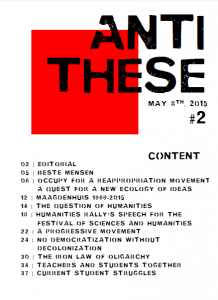Printable & readable version (to print, select the “booklet” template on PDF) : Antithese2_FINAL
Editorial
Antithese is a new platform run by and for student activists involved in the recent protests at the University of Amsterdam (UvA) and abroad. In our inaugural issue, the main focus was on the eleven days of the Bungehuis occupation, in order to collect and share testimonies, reflections or creations related to this preeminent moment of the current student struggle. This second issue builds further on what directly proceeded from the eviction of the Bungehuis: reclaiming the administration building of the UvA, the Maagdenhuis. It recalls the (re)appropriation from its very beginning, when hundreds of angry protesters broke the doors of the building in a burst of spontaneity, to its brutal end: an unnecessary intervention of riot police, violently interrupting the opening of the Festival of Sciences and Humanities, what was already decided upon to be the closing of the occupation.
It is not exaggerated to remember the phase of the Maagdenhuis (re)appropriation as strong in emotions. The speech held by Rudolf Valkhoff a few minutes before the breaking of the doors on February 25 and the auto-ethnography of the eviction on April 11 written by Julie McBrien, both included in this edition of Antithese, are two great capsules of memory giving a taste of the heat of the moment. Neither is it an overstatement to call those 45 days of community living a real social experiment. It shaped De Nieuwe Universiteit (DNU) over the course of an ongoing series of lectures, workshops, debates, seminars, film screenings, concerts, general assemblies and direct actions that merged with everyday life.
The tactic of (re)appropriation in itself can be seen as more inclusive and lasting than the barricaded occupation, and brought protesters and authorities on an unknown terrain. This concept is addressed from a theoretical perspective by helios guia in the following pages. While the reclaimed but open administration building became the domicile of a core group of “professional activists” (as the mayor of Amsterdam said in an attempt to delegitimize DNU), its function was enlarged by the daily presence of different supporters and action groups springing forth from the student movement. Rethink UvA, a collective of concerned staff members, used the Maagdenhuis as their headquarters to establish an alternative to the current top-down governance structure. In the text on Rethink by Umut Kibrit we even see their reflection taking account of their own horizontal participatory structure. Particularly substantial for our movement is the rise of the University of Colour, a group emerging from the lack of diversity in our movement itself and paving the ways toward an intersectional struggle. Their call to decolonize universities together with social movements is also figuring in this Antithese issue.
Immediately following the Maagdenhuis takeover, repercussions were already perceptible outside of Amsterdam, and continue to expand to this day. Many factions of DNU are growing in Utrecht, Rotterdam, Maastricht, Groningen, Nijmegen and Tilburg. A delegation of DNU was directly involved in the recent wave of occupations in London and brought ‘red square solidarity’ as far as Istanbul. More than 8000 academics around the world (including Noam Chomsky, Judith Butler and Simon Critchley) signed a support letter and over 70 lectures were held inside the Maagdenhuis, bringing many international critical thinkers like David Graeber and Jacques Rancière to the epicenter of our movement. This outgrow shows the significance of what happens here, and proves that our movement is not restrained to Amsterdam. What was initiated here at the UvA embraces the global struggles for the liberation of universities from neoliberal management.
In this context it is furthermore not astonishing to witness an increase of repression against these empowered student movements, here as well as abroad. The board of directors (CvB) of the UvA showed with disgrace how far the managers of the neoliberal university will go to silence the contestation by abusing their authority, intimidating the dissent community members, lying in court and in the media and using racist arguments to delegitimize the Maagdenhuis occupants. Fortunately, the solidarity within the academic community, offended by the outrageous eviction, forced the president of the CvB Louise Gunning to resign from her position.
Even though this resignation can be seen as a small victory for our movement, we cannot ignore the worrying use of state repression against us: a total of 67 students and staff members were jailed following the Bungehuis and Maagdenhuis evictions. Six students had been transferred to foreign detention, thereby pressured to identify themselves, while Dutch laws are supposed to safeguard anonymity. Many of us are now monitored by police forces, if not followed in the streets by silent cops. This continued adherence to state repression as a tool to enforce the neoliberal agenda of the administrators of universities ignites disorder on campuses around the globe. Their intolerance to dissent leaves us no choice: when injustice becomes law, resistance is a duty.
Taking part in this resistance, the texts compiled in this current issue of Antithese each shed light on and raise awareness of the recent events in Amsterdam. They will, hopefully, inform and inspire new front lines of the global student struggle.
– Antithese
May 8th, 2015

